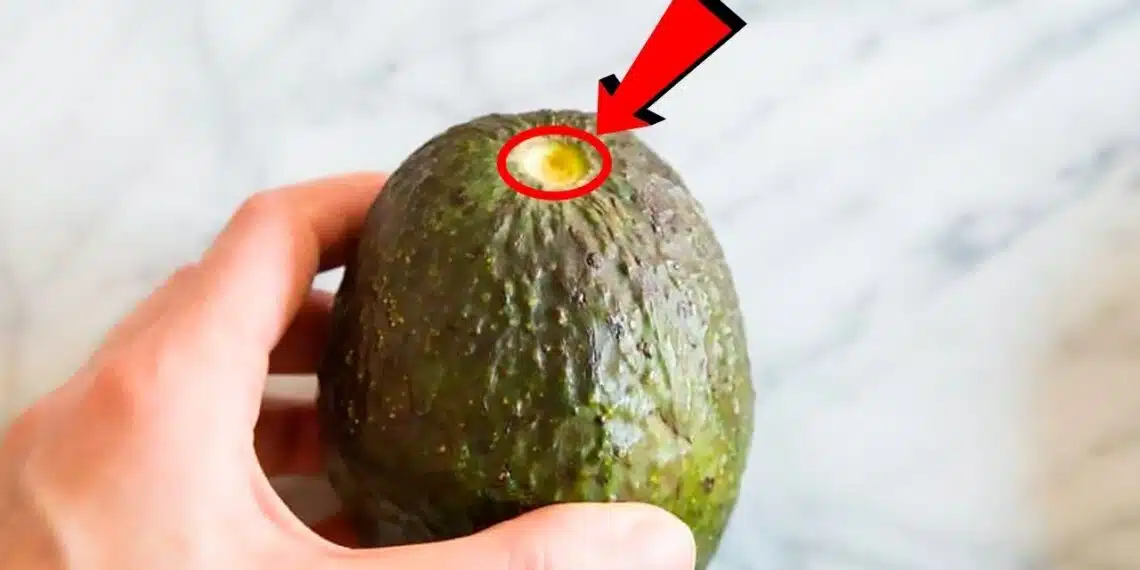Avocados can be tricky fruits to figure out. One day they’re rock-hard, and the next, they’re overripe and mushy.
Picking the perfect avocado at the store or deciding if the one on your kitchen counter is ready to eat can feel like a guessing game.
But fear not! With just a simple trick, you can determine whether an avocado is ripe inside, ensuring you never cut into an unripe or spoiled avocado again.
In this article, we’ll explain a foolproof method to check for ripeness, share some additional tips to choose the best avocados, and help you understand how to store them for maximum freshness.
The Simple Trick to Check If an Avocado Is Ripe
The easiest and most reliable way to check if an avocado is ripe is by using the “stem method.” This trick involves looking at the small stem or “nub” at the top of the avocado to determine its ripeness.
Here’s how to do it:
- Locate the Stem: Find the small, circular stem at the top of the avocado. This is where the avocado was connected to the tree.
- Gently Flick or Pull the Stem: Use your fingers to gently flick or pull off the stem. Be careful not to apply too much force, as a delicate touch is all you need.
- Observe the Color Beneath the Stem:
- Bright Green: If the area underneath the stem is bright green, the avocado is perfectly ripe and ready to eat.
- Brown: If the area is brown, the avocado is likely overripe, and the flesh may be mushy or have brown spots inside.
- Difficult to Remove or Pale Yellow: If the stem is difficult to remove or reveals a pale yellow color, the avocado is not yet ripe and needs more time to soften.
Why It Works: The color beneath the stem is a direct indicator of the avocado’s internal ripeness. The green color signifies that the flesh is at its optimal texture, while brown indicates overripeness. Using this method, you can avoid cutting into unripe or spoiled avocados and save yourself from disappointment.
Additional Tips to Choose the Perfect Avocado
While the stem trick is the most reliable method, you can also use these additional tips to ensure you pick the best avocados:
1. Check the Skin Texture and Color
- Color: Ripe avocados typically have a darker, almost black-green skin color, while unripe avocados are bright green.
- Texture: Look for avocados with slightly bumpy skin, which usually indicates ripeness. Smooth-skinned avocados are often less mature and need more time to ripen.
Tip: Color can vary depending on the avocado variety. For example, Hass avocados darken as they ripen, while some other varieties may stay green even when ripe.
2. Give It a Gentle Squeeze
Another method to test an avocado’s ripeness is by giving it a gentle squeeze in the palm of your hand. A ripe avocado should yield to gentle pressure without feeling overly soft or mushy.
- Too Firm: If the avocado is hard and doesn’t give at all, it’s not yet ripe.
- Soft with Slight Pressure: If it feels soft but not squishy, it’s ripe and ready to eat.
- Mushy: If it feels very soft and your fingers leave indentations, the avocado is likely overripe.
Tip: Avoid squeezing avocados too hard, as it can bruise the flesh inside and accelerate spoilage.
3. Listen for the Seed Rattle
If you shake the avocado gently and hear the seed rattling inside, it’s a sign that the avocado is ripe. This trick works best with slightly larger avocados where the seed has room to move.
How to Store Avocados for Maximum Freshness
Once you have found the perfect avocado, it’s essential to store it correctly to maintain its freshness. Here’s how:
1. Storing Whole Avocados
- Unripe Avocados: Leave unripe avocados at room temperature. To speed up the ripening process, place them in a brown paper bag with a banana or apple. The ethylene gas released by these fruits helps the avocado ripen faster.
- Ripe Avocados: Store ripe avocados in the refrigerator to slow down the ripening process. This can keep them fresh for up to 5 days.
2. Storing Cut Avocados
Once an avocado is cut, it’s exposed to air and can brown quickly due to oxidation. To keep it fresh:
- Wrap in Plastic Wrap: Cover the cut surface with plastic wrap to minimize air exposure.
- Use Lemon or Lime Juice: Brush the cut surface with lemon or lime juice before covering it with plastic wrap. The acid in the citrus juice helps slow down oxidation and browning.
- Store with the Pit: If you’re storing only one half of the avocado, keep the pit in the half you’re storing. The pit can help reduce browning.
Tip: Store cut avocados in an airtight container in the refrigerator and use them within 1-2 days for best results.
Bonus Tips for Using Overripe Avocados
If you find yourself with overripe avocados that are too soft for slicing, don’t throw them away! Here are some creative ways to use overripe avocados:
- Guacamole: Mash the avocado and mix it with chopped onions, tomatoes, cilantro, lime juice, and salt for a delicious guacamole.
- Smoothies: Blend overripe avocado into smoothies for added creaminess and healthy fats.
- Avocado Toast: Spread mashed avocado on toast and top with salt, pepper, and your favorite toppings like tomatoes or a poached egg.
- Face Mask: Use overripe avocado as a moisturizing face mask. The natural oils and vitamins in avocados can nourish and hydrate your skin.
Using the simple stem trick to check if an avocado is ripe is a foolproof way to ensure you always pick the best avocados.
